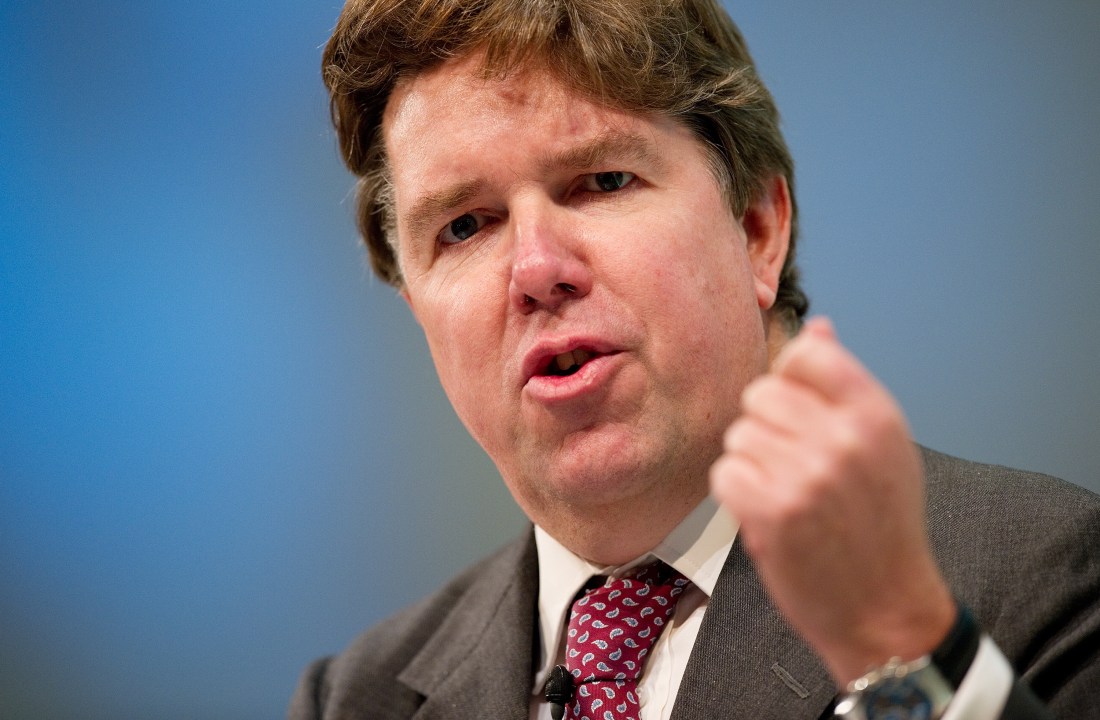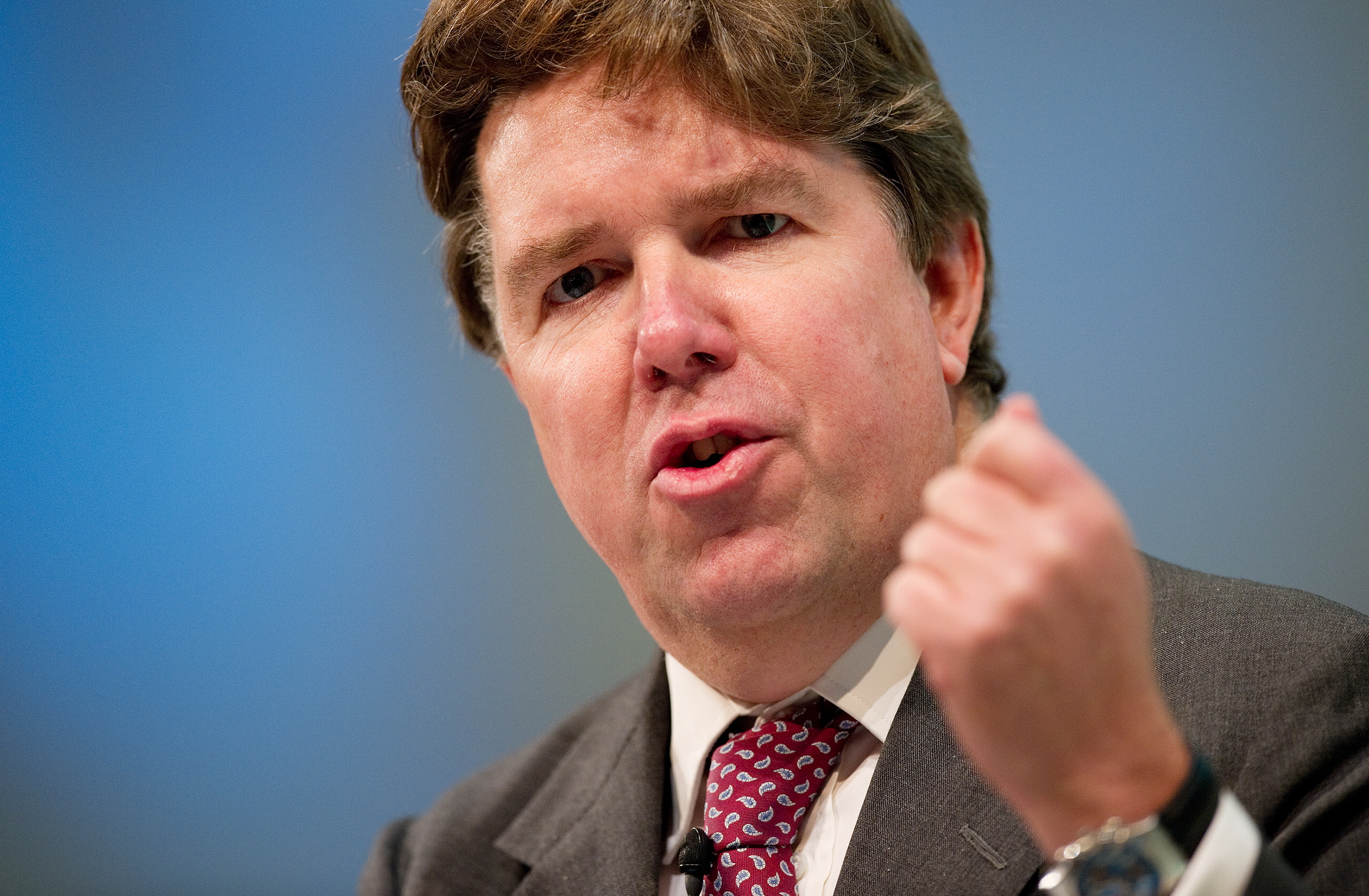Quite a spell of bowling from the Chancellor last week, skittling Stephen Hester’s stumps at RBS and causing Paul Tucker of the Bank of England to walk even before the new Canadian umpire had time to raise his finger.
The kindest thing to be said about Hester’s innings (enough of the cricket already) is that he made a pretty good stab at bringing RBS back from the dead in the face of fierce political pressure, given that he was never really the right man for the job. By this I mean that even his admirers regard him more as a natural ‘chief financial officer’ — the number-crunching post he previously held at Credit Suisse and Abbey National — than as a natural chief executive of a politically sensitive high-profile business with 100,000 staff, which required him to be Mr Motivator and Mr Media all day long.
What’s more, as the product of a modest Yorkshire upbringing turned millionaire Oxfordshire foxhunter — ‘round-faced… often smug-looking… the embodiment of fat-cat capitalism’, as the FT unkindly painted him two weeks ago — Hester was marinated in the City culture he had been hired to help undo. Like many of his peer group, his career up to the day he arrived at RBS in November 2008 had been ‘all about the money’, as an ex-colleague put it to me. What became an annual ritual of foregoing part of the reward to which he believed he was entitled was painful to watch. ‘It depends whether you think a million-pound bonus is a lot,’ a mutual friend explained: Hester plainly didn’t think it was.
As for the future of RBS, what Hester’s numbers told him over and over again was that maximum value for the taxpayer could only be obtained by holding most of the group together, retaining a viable investment banking arm to service corporate clients, and waiting as long as necessary before selling the Treasury’s 82 per cent back to the private sector, in several tranches and (as he indicated after his departure) probably over a decade. Many professionals agreed with him — and when I put it to him that early wins, pleasing to his political masters, might be had by refloating the relatively clean NatWest as a separate business and selling off Coutts as a desirable wealth-management brand, he dismissed such ideas as superficial to his core purpose.
Meanwhile, I don’t doubt (having heard it from other bankers high and low) that small-business loan demand has been subdued while the government’s Funding for Lending scheme has instead refuelled the mortgage market in what may prove to be an unhealthy way. But that was just one more thing Downing Street didn’t want to hear from Hester, and one more reason why his time was up. He won’t struggle to find another well-paid appointment, however. The awkward, media-averse number-cruncher in him had the last word when he remarked that the manner of his departure was ‘in the top quartile of ways in which I could have gone’.
A pawn in the game
As for Paul Tucker — ‘the only real central banker we’ve got’, as a Bank of England insider once described him to me — I’ve already written about the ‘small personal tragedy’ of a competent, well-liked public servant whose path to the governorship was derailed not only by the Libor scandal (in which no one suggested he was culpable) but also by the wily Osborne, using him as a pawn in a chess game against Mervyn King on policy matters while all along preferring the kudos of Mark Carney if he could get him. As I said before, I hope a job appropriate to Tucker’s standing beckons in Washington or Basle; the suggestion that he might be a candidate to take over from Hester at RBS must surely be in the bottom quartile of things he’d want to do next.
I wonder whether Hester or Tucker ever played the game my late father used to play as a Lombard Street banker long ago, which was to imagine how high the politicos he met might have risen if they had pursued careers in the City. Would Cameron have done well in wealth management, or Osborne as a cocky broker elbowing his way upwards? Mostly, of course (like John Major in his days at Standard Chartered) they’d all have been press officers, favouring the superficial over the truth of the numbers.
More gongs for bosses
An odd little Birthday Honours list, from a business point of view. BAE chairman Dick Olver looked old-fashioned among a clutch of new knights who represent more fashionable aspects of capitalism. Charlie Mayfield is head of the John Lewis Partnership, our one shining example of large-scale -employee ownership. Venture capitalist Michael Moritz is a Welsh export to California, where he was an early investor in Google. Australian-born Michael Hintze, honoured for ‘services to the arts’ though no report failed to mention his largesse to the Tory party, is a hedge-fund billionaire. And out in left field is ‘Sir Baldrick’, the actor Tony Robinson, whom the BBC was eager to label an ‘anti-poverty campaigner’.
Well, I suppose that’s what the world looks like these days. But I favour — not least because it might persuade them to accept smaller bonuses and spend less time talking to headhunters — more gongs for conventional bosses who battle along, trying to keep their companies on the road and their employees in work. Olver was the sole chairman or chief executive of a FTSE100 company to bag a title in this list. If we discount the discredited bankers, the Kazakhs and other exotic foreigners, and the few already knighted, that leaves about 150 hard–working business leaders ranked behind Hintze, whose distinction is to have bet large on the market while giving 3 per cent or so of his net worth to charity. Then there are all those job-creating entrepreneurs who have done so much to help others climb out of poverty: they’ll be curious to learn how Robinson has outshone them merely by embracing Comic Relief and emoting in the Labour interest on Question Time.








Comments